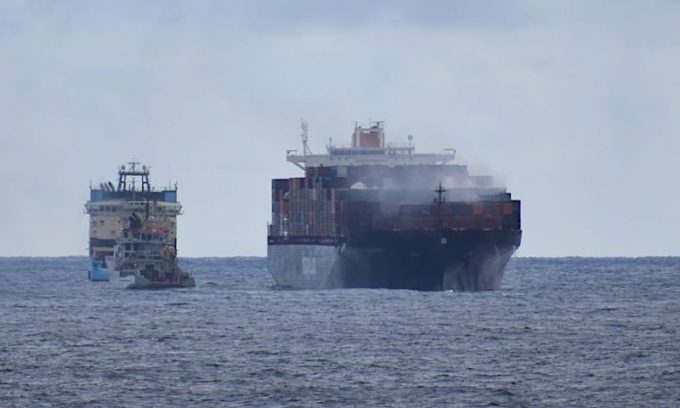Iranian troops seize MSC box ship while Somali pirates net $5m ransom for bulker
As instability rises in the Middle East, the Israel-Palestine war now threatening to encompass Iran, ...

Shippers with cargo stranded on the fire-stricken Yantian Express are still in the dark on when or where they might be likely to receive their goods.
An update from vessel owner Hapag-Lloyd this week advised customers it would take another fortnight for the discharging and inspections of boxes damaged in the fire.
The blaze broke out, in early January, in a container stowed on the 7,500 teu vessel en route to the Canadian port of Halifax.
It spread to other boxes as heavy weather rendered the crew’s fire-fighting efforts fruitless, forcing them to abandon ship. Ocean-going tugs subsequently towed it to Bahamas Freeport.
General average was declared on 28 January, but it appears the vessel will have to move to another port before boxes unaffected by the fire can be unloaded.
“We are not in a position to discharge the sound cargo at the vessel’s current location, which consists of a temporary yard that is meant to handle only the distressed cargo,” Hapag-Lloyd said.
And while there is a containerised terminal berth in the vicinity, it appears it may not have sufficient capacity for handling the sound cargo, it added.
Today, specialist supply chain insurer the TT Club renewed its call for shippers and forwarders to both properly declare container contents, as well as take greater care in the packing process.
It estimated that a major containership fire at sea occurs, on average, every 60 days, and in the space of just two and half months this year, there have already been four “major cargo-related fire incidents”.
TT Club’s records also indicated that across the intermodal spectrum, some 66% of incidents related to cargo damage “can be attributed to poor practice in the overall packing process; that is not just in securing but also in cargo identification, declaration, documentation and effective data transfer”, which it said cost insurers over $500m annually.
Furthermore, cargo handling association ICHCA International has calculated that, of the 60 million packed containers moved each year, 10%, or 6m, are declared as dangerous goods (DG). The TT Club says “information from published government inspections suggests that 20% of these are poorly packed or incorrectly identified, translating into 1.3m potentially unstable DG containers travelling around the world each year”.
TT Club risk management director Peregrine Storrs-Fox said this scale of risk is elevated when undeclared or misdeclared DG consignments are considered.
“In these cases, an estimate of volumes is more obscure. An indication has been given through the work of one container carrier, Hapag-Lloyd, developing a profiling algorithm to search its booking system for potential misdeclaration of commodities.
“Results from Cargo Patrol, when extrapolated to the carryings of all the lines, concludes a reasonable estimate in excess of 150,000 volatile containers in the supply chain each year,” he said.
Recently the TT Club launched its Cargo Integrity campaign to champion greater container safety.
“There is very much still to be done in achieving true cargo integrity. Our diverse campaign is seeking significant cultural and behavioural change to say the least. Certain elements may require legislative action, enforcement and inspection and there are great challenges in the field of technological development.
“Above all there is a need for all involved in the supply chain to have a realistic perception of risk and a responsible attitude towards liability,” he said.
Comment on this article
Frederik deCockBuning
March 21, 2019 at 3:47 pmas said before this is a poor show from HL . hope they have done a good investigation as where the fire started , who was the shipper/cargo owner – who was responsible for packing . wo’nt be surprised that this was a ‘middle man’ and not an original
first class exporter who now might suffer from other mens poor behaviour..